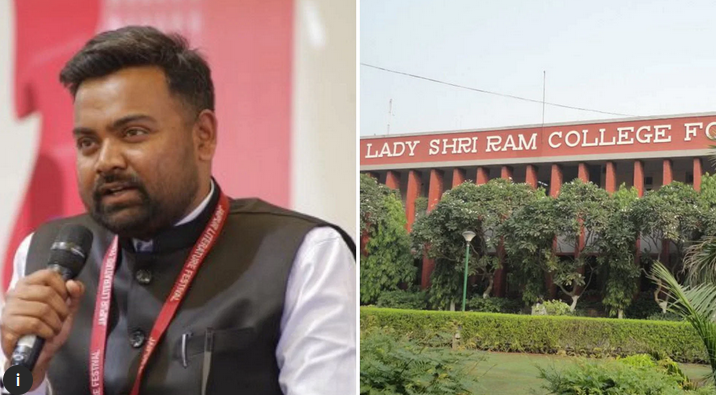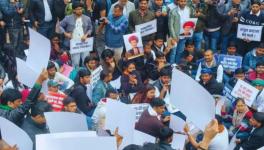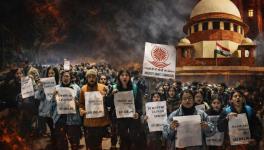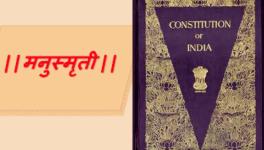LSR Students' Boycott of BJP Spokesperson is a Victory For Democracy

Image Courtesy: The Quint
On April 8, 2022, the SC-ST Cell of Lady Shri Ram (LSR) college under the University of Delhi issued a poster announcing an 'Ambedkar Jayanti' commemoration lecture. The BJP National spokesperson Guru Prakash Paswan was to deliver a talk on Ambedkar Beyond Constitution.
The students belonging to the dalit and Adivasi communities affiliated with the Students' Federation of India (SFI) and other students expressed their disagreement with the organisers. Student outrage began flowing in, resulting in a rather abrupt cancellation of the event one day prior. In response, Paswan took to social media to express his anger and disappointment at the denial of a platform by virtue of his political ideology, claiming he has become a victim to 'cancel culture'. Borrowing the title of postcolonial theorist Gayatri Spivak's famous essay, he posed a rhetoric 'can the subaltern speak?'
In a screenshot shared by Paswan, "a huge outcry from the student body" was cited as the reason for the sudden cancellation of the event.
Conveying her regret for the inconvenience caused to him, the SC-ST Cell representative stated that it was a response to the recent developments in Karnataka and JNU and that they would like to prevent LSR from becoming a political space. While it remains uncertain how far this reasoning is genuinely representative of the student community, as LSR has always had a vibrant culture of student politics, it was amply clear that the pressure from the students themselves elicited this decision.
Although ambiguous, "the recent developments in JNU and Karnataka" point to the JNU meat controversy and the hijab row, respectively. The former involved an alleged use of brute force upon the students and mess workers in the Kaveri hostel by Akhil Bharatiya Vidyarthi Parishad (ABVP) for serving meat in the hostel on the night of Ram Navami. Whereas the latter was a manifestation of islamophobia, an infringement of the bodily autonomy of women wherein Muslim girls were denied access to education on account of wearing a headscarf.
SFI-LSR, in its statement, following the cancellation of the event, congratulated the student body for redlining the session. They also made public the contents of their appeal, made to one of the SC-ST Cell representatives, to reconsider the decision to invite a BJP spokesperson to commemorate an anti-caste hero. They challenged it because the BJP has a history of oppressing marginalised communities, drawing upon their anti-reservation stance and caste apologia. It was further asserted that the blanket push of Hindutva thought into academia, and the recuperation of Ambedkar as a Hindutva icon, similar to how the right-wing has co-opted radical figures like Bhagat Singh, is dangerous and warrants resistance. SFI cautioned that it was a one-sided propagation of Sangh Parivar politics, with no room to acknowledge or entertain differing political positions, thus eliminating any scope for disseminating the propaganda. They made their case by calling attention to the BJP's betrayal of the constitutional values of secularism and democracy.
What ensued next was a national media outrage at the "intolerance" of left student organisations and censure for curbing the 'right to speech'. Paswan argued that the students should have communicated their criticism through dialogue rather than robbing him of his voice. Paswan condemned the students for not allowing a dalit from speaking on the celebration of another dalit leader; meanwhile, the students retorted that it was not his dalit identity that is of significance, but his affiliation to a political party is antithetical to Ambedkar's legacy. Here is a man who dedicated his life to the annihilation of caste and a party that unequivocally defends it. In 'Bunch of Thoughts', the foundational text of Hindutva, MS Golwalkar praises the varna system as the basis of a "harmonious social order." This position was reiterated by the former general secretary of BJP, Ram Madhav, who called caste a "genius" of our country, and the UP Chief Minister, Yogi Adityanath, who explained that caste was necessary for "managing society in an orderly manner."
SFI's rebuttal added that the spokesperson of an anti-Dalit party does not deserve a platform to appropriate Ambedkar, who was staunchly opposed to Hindutva and firmly stated that the "scheduled castes federation will not have any alliance with any reactionary party such as the Hindu Mahasabha or RSS." Ironically, while the media raged over the injustice done to Paswan, dalits celebrating Ambedkar Jayanti were brutalised by Hindutva mobs in Odisha and Uttar Pradesh. These incidents, like many others, have gone unreported by the media. Still, a barrage of articles and news reports has swarmed all mediums for the BJP leader, whose speech is supposedly suppressed. Juxtaposing the journalistic reaction to the two events that occurred on the same day exposes that silence is a fair resort when the culprit is their master.
While the prime time debates held a one-dimensional discussion upon the violation of the right to freedom in Article 19 that guarantees the freedom of speech and expression, what transpired was a contestation of the constitutionally granted right to protest by using another fundamental right, the right to free speech. Amid the clamour for 'democracy', the right to dissent was passed over. What was lost to the proponents of 'free speech was that the students had a democratic right to protest. The boycott of BJP leaders is an exercise of that very same constitutionally enshrined protection. Moreover, we must ask: what does right to speech mean if the speech is hegemonic?
In the current socio-political context, opposing the ruling government and its ideology is considered tantamount to treason; the 'freedom of expression falls under strict state scrutiny, and any attempts to question the government are violently subdued. The selective amnesia of Indian media that rushed to defend the freedom of expression of Paswan while conveniently forgetting that he represents a political party that has criminalised dissent is symptomatic of a media that is far from being independent.
Anti-Hindutva intellectuals, dalit and tribal activists, and students have been incarcerated by BJP in a brazen act of suspending democracy itself. Sudha Bharadwaj, Vara Vara Rao, Sagar Gorkha, Ramesh Gaichor, Jyoti Jagtap, Meeran Haider, Shifa Ur Rehman, Umar Khalid, Natasha Narwal, Devangana Kalita, Sharjeel Imam, Siddique Kappa, Aasif Sultan, Patricia Mukhim, Gautam Navlakha, Anand Teltumbde, Stan Swamy, Ishrat Jahan, Tahir Hussain, Gulfisha Fatima, Khalid Saifi, Akhil Gogoi, Safoora Zargar- the list of those persecuted for yielding their democratic rights continue.
Contrast this witch hunt and attempts to generate fear in the dissenters upholding democracy and constitution against the impunity of RSS and BJP hate mongers, openly calling for genocide. Kapil Mishra, Anurag Thakur, Swami Dayanand Saraswati, Pragya Thakur, Adityanath and other affiliates of the Sangh Parivar have made inflammatory statements that allegedly incited riots and widespread attacks on minorities.
With a government actively abetting violence upon marginalised communities, constitutional guarantees are rendered virtually impotent. Their disdain for democracy or constitution is no surprise if one is acquainted with history; RSS had formally rejected the Indian constitution, proclaiming 'Manusmriti' as the Hindu law, and burned effigies of Ambedkar after the Hindu Code Bill was introduced. The JNU student activist Sharjeel Imam who was booked under sedition for his speech against the Citizenship Amendment Act is languishing in prison. In contrast, Thakur, who chanted "Desh ke gaddaron ko, goli maro salon ko (Shoot the enemies of the country)" at an election rally, triggering the shooting at students of Jamia Millia Islamia, is a free man. The impunity enjoyed by these communal agents essentially declares that under the Hindutva regime, 'freedom of expression' translates to the freedom to propagate hate and sow communal divide. It is hard to imagine anything less than self-imposed oblivion or utter cowardice and complicity in the national media's response to the students' boycott of Paswan.
The notion that students belonging to marginalised and minority backgrounds must engage the representative of a party that is anti-dalit and anti-minority in intellectual dialogues to foster a democratic environment is, at best, farcical. It insists on maintaining freedom of expression circumscribed within sterile classrooms, while their contention of Hindutva outside of these academic platforms results in brutal persecution. Treating socio-political discourses as some perverse academic exercise disconnected from the social reality is an alarming indicator of a shrinking academic sphere.
The disgruntled confrontation sought by Paswan with the question 'can the subaltern speak?' is answered 'no' by his party. The deletion of texts by dalit authors Bama and Sukirtharini and its replacement with the works of upper caste writer Ramabai in the English Department of DU bespeaks that if the speech is subversive, the subaltern cannot speak. For all his enthusiasm for protecting the subalterns' right to speech, Paswan has adopted mute spectatorship at the onslaught of his community and their rights. His 'freedom of expression is quite clearly reserved for the defence of Hindutva.
Perhaps the most explicit demonstration of the media collaboration with Hindutva can be witnessed in their refusal to condemn the barring of entry to Sujat Ambedkar, grandson of Ambedkar, from Tata Institute of Social Sciences, on the very same occasion. It is made evident that this cry against "intolerance" does not extend to the ruling party, merely its opposers. The act of burning a book (Manusmriti) by Ambedkar in protest and thereby its rejection can be paralleled to the rejection of its espousers themselves by the students of LSR. By boycotting BJP leaders, they made a political statement that is much needed today. Respecting the students' democratic verdict is also intrinsic to democracy. Still, it seems to irk Paswan that the principles he has evoked to safeguard his rights justify the students' actions. The defenders of democracy must be reminded today that progressive student communities holding the ruling government accountable for its crimes and shunning its representatives are the highest form of democracy.
The writer is a graduate in Psychology from Indraprastha College for Women, University of Delhi. All views are personal.
Get the latest reports & analysis with people's perspective on Protests, movements & deep analytical videos, discussions of the current affairs in your Telegram app. Subscribe to NewsClick's Telegram channel & get Real-Time updates on stories, as they get published on our website.
























